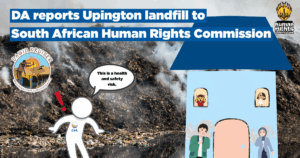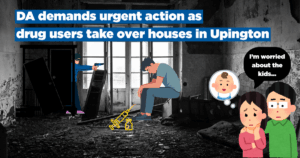Almost five years after its opening, the Kimberley mental hospital is a big mess and a hotbed of risks for patients and staff.
An oversight inspection to the hospital by DA MPL, Ofentse Mokae, revealed that the grounds are heavily overgrown. The maintenance contract came to an end in June 2022. There are no artisans on site and, as a result of the centralisation of finances, it is a struggle to effect the most basic maintenance, such as attending to leaky roofs and unblocking drains.
With only 153 beds out of 287 being operationalized to date, the grand multi-billion-rand hospital is not much better off than its predecessor, the old West End Hospital, which functioned at a capacity of 133 beds.
With the new facility functioning at only 53% capacity, children and adolescent patients with psychotic conditions are accommodated in wards with voluntary adults, while children who are in conflict with the law are accommodated at places of safety. Patient safety incidents have been reported at the places of safety, but not at the hospital. The risk of mixed child and adult wards nonetheless remains a high risk.
Operationalization of the 17-bed child and adolescent ward will come at a projected cost of R24 million. Given that the hospital has a current annual budget of R106 million, which compares poorly to the budget of the old West End Hospital, at R108 million in 2019, it is unlikely that this ward will be operationalized any time soon.
It is not only the right to safety of young mental health care patients that is at risk. The continued practice of keeping state patients in jail is regarded as a gross human rights violation.
The hospital has 80 commissioned beds for state patients. Of the 64 state patients currently transferred to the mental hospital, 35 are currently on leave of absence. Meanwhile, 28 state patients are being housed in prison. The lack of human resources and infrastructure at the mental hospital is likely to delay the transfer of the next tranche of state patients to the hospital in the near future. This is despite plans to use an alternative ward to accommodate any overflow of state patients.
With regards to human resources, the hospital, which previously boasted five psychiatrists, now only has two. There is clearly a lack of general staff, as a desolated reception area at the main entrance greets one. There is also a dire lack of security.
The hospital has 68 appointed in-sourced security guards but requires an additional 60 security personnel. The hospital makes use of a hybrid security model, with the in-sourced security seeing to the general wards. The contracted security firm, Defensor, facilitates security of state patients, with five security guards per ward. Even then, security remains a risk, as the hospitals automated doors no longer lock due to an ongoing power crisis at the hospital.
Following several incidents of cable theft and vandalism at the hospital’s substation, it was rendered an empty shell, forcing the hospital to make use of a generator. To prolong the use of the generator and to preserve diesel, the hospital only runs the generator from 8am until 1pm, and again from 6pm until 4am. For the remaining hours of the day, the hospital implements its own form of daily loadshedding. This has a severe impact on the hospital.
When diesel runs out, due to the lengthy centralized procurement process, the hospital and its vast grounds are plunged into total darkness with no warning. This poses a further threat to the safety and wellbeing of staff and patients.
Due to the electricity crisis, the landlines and internet do not work. The hospital has also been without warm water since October last year, with staff boiling kettles to provide patients with warm water for bathing. The Heating Ventilation Air Conditioning system has also not been working for some time, making the hospital unbearably hot in summer and cold in winter. In effect, the pharmacy has had to close down, due to no longer meeting licensing requirements with it being unable to regulate temperatures. Stock is kept at the TB hospital instead. Cooler boxes are used to maintain the cold chain at the hospital, for medication required on site.
The situation at the mental hospital is dire and while dedicated staff try to make the most of a bad situation, a massive, higher-level intervention is needed to restore safety, services and dignity to the staff and patients who work and are cared for at the mental hospital.
In commemoration of South Africa Human Rights Day, the DA will ask the MEC of Health, Maruping Lekwene and the Acting HOD of Health, Mxolisi Mlatha, to commit themselves to bringing quality mental health care services to the mental hospital. This includes stopping the further centralization of healthcare funding, which has already proved detrimental to the new mental hospital.
Given the ANC government’s persistence towards implementing a National Health Insurance (NHI) however, we know this is a longshot. We therefore urge voters to rather vote for the Democratic Alliance (DA), which is committed to achieving universal access to healthcare for all citizens by making the current district management model work through governance reform as opposed to centralising all healthcare system functions through the NHI.









